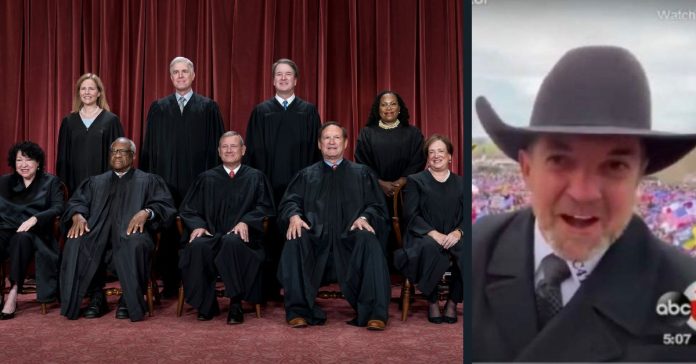
Left: The justices of the United States Supreme Court (Alex Wong/Getty images). Right: Couy Griffin at the Capitol on Jan. 6 (via DOJ court filing).
The Supreme Court declined to hear the appeal of the “Cowboys for Trump” founder — and convicted Jan. 6 rioter — on Monday, thereby following through on its declaration that while states may not disqualify insurrectionists from holding presidential office, they can certainly unseat state officials.
“We conclude that States may disqualify persons holding or attempting to hold state office,” the justices wrote in an unsigned opinion on March 4 about the ultimately unsuccessful effort to get Donald Trump kicked off the presidential primary ballot in Colorado (emphasis in original).
The Court’s decision Monday means that a ruling by the top court in New Mexico will stand against the only U.S. elected official that has been barred from holding office because of his participation in the Jan. 6, 2021 insurrection at the U.S. Capitol.
Former Otero County, New Mexico, commissioner Couy Griffin, who founded “Cowboys for Trump,” was convicted in March 2022 of entering a restricted area — a misdemeanor — for participating in the Jan. 6 attack on the U.S. Capitol. Griffin was acquitted of a second misdemeanor charge of disorderly conduct after a bench trial before U.S. District Judge Trevor McFadden, a Donald Trump appointee.
Griffin was recorded standing with a megaphone over the crowd outside the Capitol and boasted on social media that he “climbed up on the top of the Capitol building” and “had a first row seat” to the violence. According to the criminal complaint filed against him, Griffin promised, “we will plant our flag on the desk of Nancy Pelosi and Chuck Schumer and Donald J. Trump if it boils down to it.”
Griffin, a Republican, was elected to the three-member commission of Otero County, New Mexico, in 2018, winning 65% of the vote against his Democratic opponent. An effort to recall him was launched in after his arrest for his involvement in Jan. 6, but it failed to get enough signatures by the September deadline.
Following his criminal conviction, Griffin was the subject of a New Mexico state trial in 2022, which resulted in his being disqualified from office under the insurrection clause — the same provision of the 14th Amendment that Colorado invoked to kick Trump off its presidential ballot. Griffin’s disqualification was the first of its kind since the immediate aftermath of the Civil War. The insurrection clause was specifically written for the purpose of keeping the former Confederates from holding government office.
The case against Griffin was filed on behalf of three New Mexico residents by Citizens for Responsibility and Ethics in Washington (CREW), the same advocacy group that brought the Colorado lawsuit to disqualify Trump.
Ultimately, the Supreme Court overturned the Centennial State’s ruling against Trump and found that states have no right to enforce the insurrection clause against presidential candidates. The Court’s ruling was a narrow one that explicitly said different rules are applicable to the state and local candidates, over whom states have more authority.
At Griffin’s 2022 trial in state district court, New Mexico First Judicial District Judge Francis Mathew found the Jan. 6 attack to constitute an insurrection under the Constitution, and ruled that Griffin non-violently aided that insurrection, contributing to a delay in Congress’ election certification proceedings.
Although the justices’ denial of certiorari Monday was handed down without comment, it clearly underscores the Court’s position of two weeks earlier: the Insurrection Clause is a viable means of keeping participants in the Jan. 6 insurrection from holding state office.
Brandi Buchman contributed to this piece.
Have a tip we should know? [email protected]

